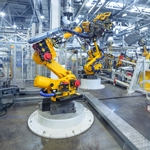
Industry 4.0 has been a top buzzword in manufacturing for the last few years. When people think about industry 4.0, some envision dark manufacturing facilities fully operated by robotics. But in reality there are myriad implementation measures across a broad spectrum of operational and administrative functions.
Here are three industry 4.0 investments your manufacturing company should consider implementing.
More automated manufacturing equipment
Your equipment does not necessarily have to be fully automated, but advances in technology have allowed for equipment historically operated by two to three employees to now be operated by just one. This can have a drastic improvement on your company’s overhead, or increase production capacity by diverting skilled labor to other areas of the facility and other production cycles.
Updates to equipment can also improve production time, decrease quality control costs, and allow your company to reach new markets. Think of a professional golfer trying to compete with 20 year old clubs. Coupled with the low interest rates available, now may be the time to invest in updated equipment.
Internet of things (IoT) enabled machines
IoT is another broad category, but within the manufacturing industry it often means equipping various operational assets with sensors and other technology to send and receive data throughout the organization. With office and sales staff still potentially working remotely, now more than ever companies need fully integrated machines that provide real-time data not just to the accounting department, but also to the engineering, quality control, sales, and purchasing departments.
Production equipment that interfaces with all aspects of the business will lead to improved and faster financial reporting, shorter machine down time and improved data for the maintenance department, and quicker lead times for new or customized products. It can also provide better resources and information for the sales department, which will be able to immediately determine whether and how quickly a customer’s product specifications can be made.
Additive manufacturing
While 3D printing was once viewed as a way to quickly create prototypes or new products, its capabilities have expanded as the technology has become more mainstream. In manufacturing, it has become a useful tool for inventory management, specifically for replacement parts. Instead of maintaining a warehouse full of replacement parts, companies can now store these parts as design files and produce them as needed.
Implementation not only reduces warehouse costs, but can also improve companies’ scrap and obsolete inventory costs. Additionally, 3D printing can facilitate new product or customer growth by producing small or customized orders that were once cost prohibitive if they required too much change to the production line.
Another positive consequence of investing in industry 4.0 initiatives is its effect on the skilled labor shortage, an issue manufacturers have been dealing with for years. While investing in a state of the art facility may or may not lower your headcount, it may help attract younger talent who are more inclined to work at a facility stocked with updated equipment and advanced technology, versus the older facilities whose image the industry has been trying to shift away from. Again, think of a golf club manufacturer trying to attract younger players with those 20 year old clubs!
Steven P. Feimster can be reached at Email or 215.441.4600.
You may also like:


